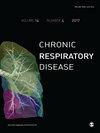CRD编辑角存档:10 - 12月
IF 3.5
3区 医学
Q2 RESPIRATORY SYSTEM
引用次数: 0
摘要
神经肌肉疾病中的呼吸机依赖——管理生活的基础。。。2021年12月21日当神经肌肉疾病患者越来越依赖全天候无创通气(NIV)时,饮食和谈话等简单的生活基础成为一个重大挑战。在本月的期刊上,Kinnear及其同事观察了人们在使用NIV时如何管理这些功能。重要的是,他们能够安全地做到这一点,例如通过在呼吸机呼吸之间定时吞咽。在这种情况下提供正确的支撑可以避免管饲,这对许多人来说是一个重要的考虑因素-米克·斯坦纳,《慢性呼吸系统疾病》主编。新冠肺炎大流行期间胸膜疾病的管理。继续演出。2021年12月16日疫情的一个积极后果是,以前高度依赖患者面对面接触的临床服务的提供速度加快了。Ajmal及其同事很好地证明了在三级医院提供胸膜服务是如何做到这一点的,他们结合了分诊流程,将病例引导到最合适的临床患者接触形式。这种创新似乎很可能会持续下去——我们期待看到更多关于对临床结果和患者护理体验的影响的数据-米克·斯坦纳,《慢性呼吸系统疾病》主编。运动神经元疾病的通气支持。随机对照试验之外的证据。2021年12月2日为运动神经元疾病患者提供通气支持是一种治疗师知道可能有效的干预措施,但只有有限的临床试验证据支持。现在很难进行更多的试验,因为在对照组中拒绝标准护理是不道德的。因此,判断有效性需要不同的证据来源,Walsh等人在本月的期刊上提供了在其中心接受治疗的临床患者队列的深入数据。他们证明,成功启动和坚持NIV与延髓占主导地位的疾病患者的更长生存期有关。当然,可能有各种混杂因素影响干预和结果之间的因果关系。然而,从临床角度来看,这些数据应该推动向那些可能需要治疗的人提供治疗,尤其是支持更广泛的多专业团队帮助患者始终如一地使用设备-米克·斯坦纳,《慢性呼吸系统疾病》主编。原发性纤毛运动障碍中的无色杆菌种类。我们应该担心多少?2021年12月2日肺部持续细菌定植在支气管扩张和囊性纤维化中的临床重要性越来越得到认可,但在PCD等罕见疾病中的数据较少,不太常见的生物体的作用也不确定。在本月的期刊上,Holgerson等人提供了PCD登记处的数据,记录了痰液培养中无色杆菌属的纵向流行率以及与疾病严重程度的关系。每年只有大约5%的患者表现出阳性培养,但这一发现与肺功能较差有关。这种关联的因果关系无法轻易确定,也很难确定是否有必要对阳性培养物进行强化抗生素治疗。前瞻性干预研究当然是可取的,但我们知道,对于罕见疾病中罕见的微生物事件来说,这将是多么困难!Holgerson及其同事的研究等队列研究提供了重要的见解,但在为患者提供建议时,我们将继续依赖临床判断和经验-Mick Steiner,编辑主任,慢性呼吸系统疾病。改进的运动训练技巧–了解患者的观点本文章由计算机程序翻译,如有差异,请以英文原文为准。
CRD Editor’s corner archive: October-December
Ventilator dependence in neuromuscular disease – managing life’s basics ... December 21st, 2021 When people with neuromuscular disease become more dependent on round the clock noninvasive ventilation (NIV), the simple basics of life such as eating, drinking and talking become a significant challenge. In the journal this month, Kinnear and colleagues, observe how people manage these functions whilst using NIV. Importantly, they manage to do this safely for example by timing swallowing between ventilator breaths. Providing the right support in this situation may allow tube feeding to be avoided an important consideration for many. -Mick Steiner, Editor-in-Chief, Chronic Respiratory Disease. Management of pleural disease during the COVID-19 pandemic. Keeping the show on the road. December 16th, 2021 A positive consequence of the pandemic has been the pace of innovation in the delivery of clinical services previously highly reliant on face to face patient contact. Ajmal and colleagues demonstrate nicely how this was achieved for the delivery of pleural services in a tertiary hospital by incorporating a triage process to direct cases to the most appropriate form of clinical-patient contact. It seems likely such innovations are here to stay – we look forward to seeing more data on impacts on clinical outcomes and the patient’s experience of their care. -Mick Steiner, Editor-in-Chief, Chronic Respiratory Disease. Ventilatory support in Motor Neurone Disease. Evidence beyond RCTs. December 2nd, 2021 The provision of ventilatory support in people with motor neurone disease is an intervention that therapists know can be effective but is supported by only limited clinical trial evidence. It would be difficult to undertake more trials now because withholding a standard care in a control group would be unethical. Judging effectiveness therefore requires different sources of evidence and in the journal this monthWalsh et al. provide insightful data from a clinical cohort of patients treated in their centre. They demonstrate that successful initiation and adherence to NIV is associated with longer survival in patients with bulbar predominant disease. Of course there may be a variety of confounding factors affecting the causal link between the intervention and the outcome. However, from the clinical perspective, these data should drive the offer of treatment to those who might need it and in particular underpin the support of the wider multi-professional team in helping patients use the equipment consistently. -Mick Steiner, Editor-in-Chief, Chronic Respiratory Disease. Achromobacter species in primary ciliary dyskinesia. How much should we worry? December 2nd, 2021 The clinical importance of persistent bacterial colonisation of the lung in bronchiectasis and cystic fibrosis is increasingly recognised but there are fewer data in rare conditions such as PCD and the role of less common organisms also uncertain. In the journal this month, Holgerson et al. present data from a PCD registry documenting the longitudinal prevalence of Achromobacter species in sputum cultures and the associations with disease severity. Only around 5% of patients demonstrated positive cultures each year but the finding was associated with poorer lung function. The causality of this association cannot easily be ascertained and it remains difficult to be sure whether intensive antibiotic therapy in response to a positive culture is warranted. Prospective intervention studies would of course be desirable but we understand how difficult this would be for an uncommon microbiological event in a rare disease! Cohort studies such as the study of Holgerson and colleagues offer significant insight but we will continue to have to rely on clinical judgement and experience when advising patients. -Mick Steiner, Editorin-Chief, Chronic Respiratory Disease. Modified exercise training techniques – getting the patient’s view
求助全文
通过发布文献求助,成功后即可免费获取论文全文。
去求助
来源期刊

Chronic Respiratory Disease
RESPIRATORY SYSTEM-
CiteScore
5.90
自引率
7.30%
发文量
47
审稿时长
11 weeks
期刊介绍:
Chronic Respiratory Disease is a peer-reviewed, open access, scholarly journal, created in response to the rising incidence of chronic respiratory diseases worldwide. It publishes high quality research papers and original articles that have immediate relevance to clinical practice and its multi-disciplinary perspective reflects the nature of modern treatment. The journal provides a high quality, multi-disciplinary focus for the publication of original papers, reviews and commentary in the broad area of chronic respiratory disease, particularly its treatment and management.
 求助内容:
求助内容: 应助结果提醒方式:
应助结果提醒方式:


